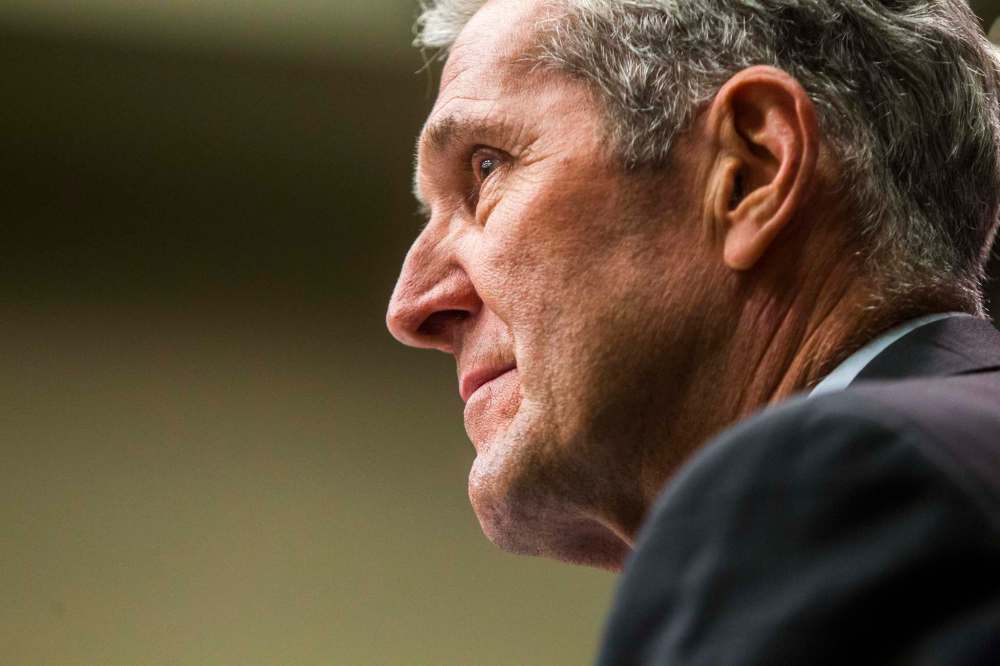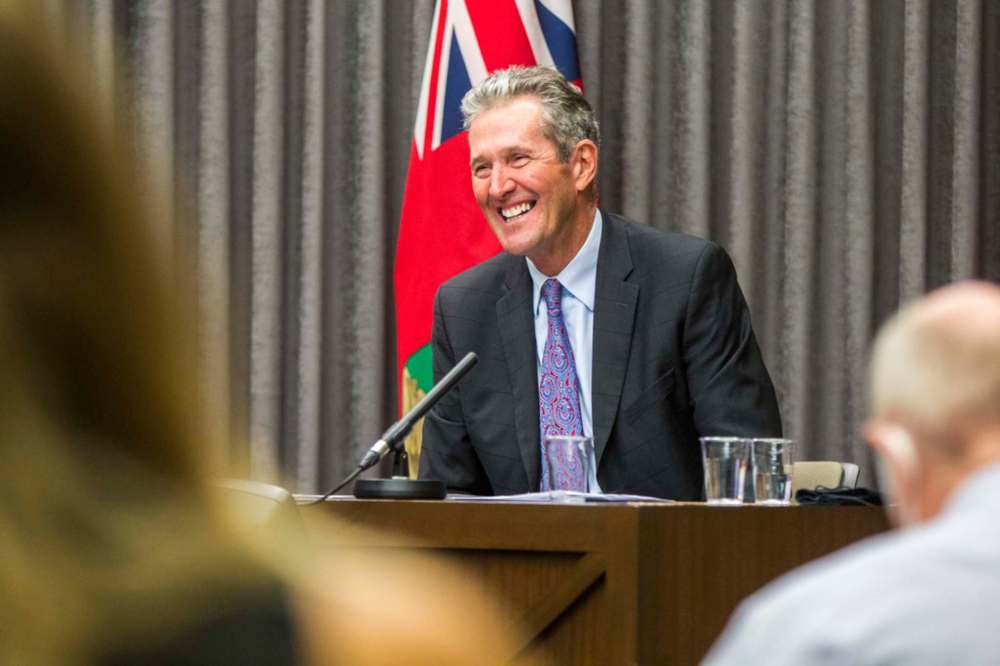Ignoring the facts makes for a better budget story
Read this article for free:
or
Already have an account? Log in here »
To continue reading, please subscribe:
Monthly Digital Subscription
$0 for the first 4 weeks*
- Enjoy unlimited reading on winnipegfreepress.com
- Read the E-Edition, our digital replica newspaper
- Access News Break, our award-winning app
- Play interactive puzzles
*No charge for 4 weeks then price increases to the regular rate of $19.00 plus GST every four weeks. Offer available to new and qualified returning subscribers only. Cancel any time.
Monthly Digital Subscription
$4.75/week*
- Enjoy unlimited reading on winnipegfreepress.com
- Read the E-Edition, our digital replica newspaper
- Access News Break, our award-winning app
- Play interactive puzzles
*Billed as $19 plus GST every four weeks. Cancel any time.
To continue reading, please subscribe:
Add Free Press access to your Brandon Sun subscription for only an additional
$1 for the first 4 weeks*
*Your next subscription payment will increase by $1.00 and you will be charged $16.99 plus GST for four weeks. After four weeks, your payment will increase to $23.99 plus GST every four weeks.
Read unlimited articles for free today:
or
Already have an account? Log in here »
Hey there, time traveller!
This article was published 29/09/2020 (1894 days ago), so information in it may no longer be current.
In Premier Brian Pallister’s world, the public accounts for the 2019-2020 fiscal year serve as the ultimate good news story.
The final accounting of government revenues and expenditures, the public accounts show a small surplus of $5 million. According to Pallister, this was accomplished without much pain for Manitobans, who can now share in the knowledge that finally, mercifully, the books are balanced.
Of course, in accentuating the positive, Pallister had to ignore a few things.
Such as tens of thousands of government workers who have gone without a pay increase for three years. And a health-care system that, despite an influx of funds last year, continues to suffer from three years of crippling underfunding. And infrastructure spending that has been cut back by hundreds of millions of dollars. And an education system in chaos from the dual pressures of austerity and pandemic upheaval.
Balanced-budget celebration fleeting

Posted:
Just as COVID-19 was hitting Manitoba last March, the province was poised to close the books on a balanced budget. Now, with the virus firmly entrenched, the government is facing a gargantuan shortfall that's approaching $3 billion.
Pallister celebrates political goal

Posted:
Manitoba Premier Brian Pallister took time to celebrate accomplishing one of his major political goals Tuesday, while fending off questions about his future.
For Manitobans who value a balanced budget above all else, this was a very good day, indeed. You may need to squint a bit to see the beauty in Pallister’s fiscal accomplishments, but there is no doubt that some will find it appealing.
What is less clear is how many Manitobans will be infuriated by the premier’s attempts to put lipstick on what is an accounting swine. The very modest surplus the Pallister government reported is more a testament to the capacity of politicians to manipulate the year-end financial results than a fiscal accomplishment in its own right.
Pallister repeatedly insisted that the return to balance — two years ahead of schedule — was not the result of spending cuts. “We did it making our province more attractive to investment.” That appeared to be a reference to the fact the Manitoba economy produced $610 million more in revenue than budgeted.
But look deeper. At least half of that figure came from yet another huge increase in federal transfer payments. The Pallister government tried to obscure this fact by producing a table in its media package that showed federal transfers were a larger portion of overall revenues in the final years of the previous NDP government.
Left out is the fact that the NDP governed through the 2008 global economic collapse, which eviscerated own-source tax revenues and made transfer payments appear larger. That observation does not erase the fact that Pallister is currently getting $1 billion more per year in equalization payments alone than the NDP received.
On the expenditure side, Pallister continues to keep firm downward pressure on key budget lines.
This year’s public account showed a 2.4 per cent increase in education funding, year over year, and a 4.6 per cent increase in health-care funding. The government claims only $38 million of that increase is due to COVID-19 spending. That seems unreasonably low given that preparations for the pandemic were supposed to have started in earnest before the end of the fiscal year, March 31.
Which brings us to another sleight of hand employed in these public accounts: broad latitude in how and when government books extraordinary expenses and revenue to manipulate the year-end balance.
In the first-quarter fiscal update delivered Tuesday alongside the public accounts, finance officials forecast a deficit of $2.9 billion for the 2020-2021 year. Although the pandemic will most definitely eliminate the surplus, that figure is clearly inflated.
The $2.9 billion deficit includes the full $240 million budgeted cost of the Pallister government’s economic-support programs even though to date, only $134 million has been paid out. The deficit forecast also does not account for an estimated $500 million in federal COVID-19 funds to help restart the economy and expand testing capacity.
Together, that’s more than $600 million that can be taken right off the top of the deficit forecast.
It must be noted that these are not accounting strategies unique to the Pallister government. Previous governments of all stripes have moved expenses and revenues around to create a narrative for the budget and public accounts. But you cannot hide the ugly stuff forever.
Pallister tried unsuccessfully to defend his government’s record on health care by claiming that Manitoba is one of the only provinces to see an improvement in wait times in the past year. That is true, but also misleading.
Manitoba saw an improvement in hip, knee and cataract surgeries in the last fiscal year only because wait times had grown considerably longer after the Tories essentially froze funding. Even with a small improvement, our wait times are longer than they were when the Tories took over in 2016 and continue to be among the longest in the country.
Strip away all of the flowery rhetoric about Manitobans sharing in the glory of the surplus, and the public accounts still provide deep insight into the fiscal bargain Pallister has offered Manitobans for the last four years.
On one side you have anemic spending in infrastructure, health care and education, frozen funding for municipalities and a three-year wage freeze for civil servants. On the other, you have one-point cut in the sales tax, a smaller sales tax base and a massive increase in the Fiscal Stabilization Fund, the province’s so-called rainy-day fund.
Pallister’s continued claim that he balanced the budget without any negative impact on services or people is simply and empirically untrue.
It is, however, the central lie in a desperate campaign by the premier to paint a smiley face on his decidedly vexing record of fiscal management.
dan.lett@freepress.mb.ca

Born and raised in and around Toronto, Dan Lett came to Winnipeg in 1986, less than a year out of journalism school with a lifelong dream to be a newspaper reporter.
Our newsroom depends on a growing audience of readers to power our journalism. If you are not a paid reader, please consider becoming a subscriber.
Our newsroom depends on its audience of readers to power our journalism. Thank you for your support.






